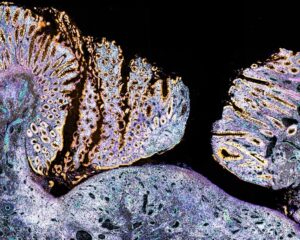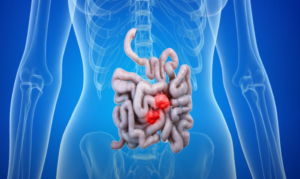An international study has identified a blood-based indicator of intestinal damage and inflammation that strongly predicts mortality in sick children. The new biomarker could help to identify those children at greatest risk of dying after hospitalisation in parts of the world with limited ... READ MORE
News for Inflammation across Tissues
Unique UK re-audit of upper gastrointestinal bleeding highlights progress
A major UK-wide audit has shown significant improvements in outcomes for patients admitted to hospital with acute upper gastrointestinal bleeding – and highlighted clear areas for further progress. This re-audit, which followed an earlier audit in 2007, was led from Oxford, conducted by experts ... READ MORE
Oxford and GSK launch Experimental Medicine Collaboration
The pharmaceutical multinational GSK is investing £10 million over five years to establish the Experimental Medicine Collaboration with the University of Oxford. The GSK and University of Oxford Experimental Medicine Collaboration (EMC) is a pioneering partnership that aims to redefine the ... READ MORE
Scientists map cells that drive Crohn’s disease fistulas, paving way for targeted treatments
Scientists at the University of Oxford, have identified how rare populations of abnormal cells drive the formation and persistence of fistulas – painful, tunnel-like tracts that develop in around 30% of people with Crohn’s disease. Crohn’s disease is a long-term disease that affects around one ... READ MORE
New research identifies key driver of inflammation in spondyloarthritis
Researchers have identified a possible cause for the protein Interleukin-17 (IL-17) driving inflammatory arthritis, paving the way for the development of targeted therapies to treat the condition. IL-17 is a key inflammatory protein that drives joint inflammation in spondyloarthritis (SpA), a ... READ MORE
Study identifies key immune structures in the gut that may drive coeliac disease
Researchers in Oxford have found structures of immune cells in the gut that may be driving the response to gluten in people with coeliac disease and could provide a target for future therapies. The team from the University of Oxford, supported by the NIHR Oxford Biomedical Research Centre ... READ MORE
New guidelines published for monitoring IBD patients to prevent bowel cancer
Researchers and clinicians have developed major new guidelines for the monitoring of patients with inflammatory bowel disease (IBD) to prevent them going on to develop bowel cancer. The new guidelines, developed for the British Society of Gastroenterology by academics at the Universities of ... READ MORE
Scientists create new way to predict bowel cancer risk in people with IBD
Researchers have found a way to identify people with inflammatory bowel disease (IBD) who are at the highest risk of developing bowel cancer. IBD, which affects around 500,000 people in the UK, includes ulcerative colitis and Crohn’s disease. They irritate the lining of the bowel, which can ... READ MORE
BRC-supported rheumatologist receives prestigious NIHR professorship
An Oxford BRC-supported researcher has become the first rheumatologist to be awarded a prestigious Research Professorship from the National Institute for Health and Care Research (NIHR). Professor Laura Coates (pictured), a Senior Clinical Research Fellow in the Nuffield Department of ... READ MORE
Study charts course for next generation of drug targets in autoimmune diseases
In a world first, researchers in Oxford have mapped the cellular dynamics following treatment with the most commonly used advanced therapy in autoimmune diseases. They have discovered why some patients benefit from this therapy while others do not, potentially paving the way for new therapies. ... READ MORE
Research identifies autoimmunity against a key anti-inflammatory regulator in IBD
A ground-breaking study has identified a new disease-inducing mechanism for inflammatory bowel disease (IBD) in which the immune system attacks its own regulatory function. Interleukin-10 (IL10) is an anti-inflammatory protein that crucially controls intestinal immunity. Children with genetic ... READ MORE
Study identifies ways cancer treatment may lead to harmful side effects
A team of University of Oxford researchers have identified potential pathways by which cancer treatment can cause colitis. Checkpoint inhibitors (CPIs) are a type of cancer treatment that help the immune system fight cancer by removing some of its restraints. However, these treatments ... READ MORE
New NIHR Oxford Senior Research Fellows named
Researchers from a wide range of disciplines have been appointed to be the next cohort of NIHR Oxford Senior Research Fellows – seven mid-career researchers identified as having the potential to become future translational research leaders. As in previous years, the selection ... READ MORE
“Don’t think ‘someone else can do it’; you need to be that person.”
Research participant profile: Maryam Masood was diagnosed with ulcerative colitis at the age of 20. But that had followed three years of symptoms and uncertainty about what was causing them. She is now taking part in research trials supported by the NIHR Oxford Biomedical Research Centre (BRC), ... READ MORE
Genetic signals that cause ankylosing spondylitis uncovered
A study by University of Oxford researchers has uncovered the genetic signals that cause ankylosing spondylitis, a common form of spinal arthritis. The results of the study, published in the journal Cell Genomics, offer new hope to patients and their families, as they pave the way for the ... READ MORE
‘Game-changing’ drug found to be effective to treat chronic pouchitis
A study led by Oxford researchers has found that the drug vedolizumab can induce remission in patients who have chronic pouchitis after surgery for ulcerative colitis. Twelve percent of people with ulcerative colitis need surgery to have their colon removed. Most have an ileo-anal pouch ... READ MORE
National guidelines produced on use of genomics in treatment of IBD
National guidelines have been developed for clinicians on the use of genomics to diagnose and care for patients with monogenic inflammatory bowel disease (IBD), a group of intestinal disorders caused by variations in a single gene. The new guidelines, unveiled in an article in the Lancet ... READ MORE
Better diagnosis and treatment of autoimmune diseases a step closer
A study involving Oxford researchers has outlined a way to find the crucial peptides (protein fragments) that drive autoimmunity, as well as the immune cells that respond to it. On a fundamental level, in autoimmune diseases immune cells mistake healthy cells for infected cells. Finding the ... READ MORE
Adalimumab found to be cost-effective treatment for early-stage Dupuytren’s disease
Oxford researchers supported by the Oxford BRC have found that the anti-TNF treatment adalimumab is likely to be a cost-effective treatment for people affected by early-stage Dupuytren’s disease. Anti-TNF treatments interfere with the action of a protein called tumour necrosis factor (TNF) and ... READ MORE
Professor Fiona Powrie recognised in Queen’s Birthday Honours
Professor Fiona Powrie, who leads the Oxford Biomedical Research Centre’s Gastroenterology and Mucosal Immunity Theme, has been honoured in the 2022 Queen’s Birthday Honours List. Prof Powrie, Director of the Kennedy Institute of Rheumatology, was appointed Dame Commander of the Most Excellent ... READ MORE
- 1
- 2
- 3
- 4
- Next Page »
















